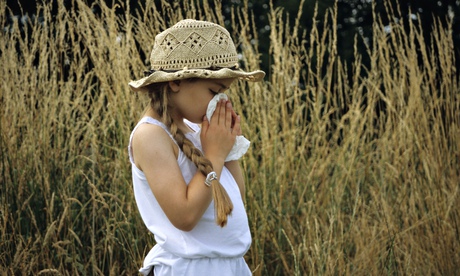
A runny nose that feels blocked up, itchy eyes, sneezing and headaches are symptoms that two in 10 people have for at least one season a year. Hay fever, whether due to grass (mid-May to July) tree (late March to mid-May), or weed pollen (end of June to September), has become increasingly common. Most hay fever starts in childhood, sometimes with pre-schoolers but often in early teenage years.
Hay fever is an allergic response – the cells lining the nose become oversensitive to pollen (and in other cases, to house dustmites or animal fur) and release chemicals such as histamines that inflame the nose (rhinitis) and eyes (conjunctivitis). A clinical review in this week's BMJ says that allergic rhinitis in general can seriously reduce a child's quality of life (and how well they do at school) as well as being a risk factor for asthma. So should you treat your child's hay fever? Can you bear sticking in eye drops and getting them to use nasal sprays?
The solution
Hay fever can be horrible for children (runny noses aren't fun, and a blocked nose disrupts sleep), especially at exam time. Practical measures to reduce exposure to pollen do help, but most people don't take them. Pollen levels are highest in the early morning and early evening so keep windows (including in the car) closed. Wash your child's face and hair when they come in from outside as pollen sticks on hair and skin. Wraparound sunglasses will protect their eyes, and smearing Vaseline inside their nose can reduce pollen inhalation.
Your child should stay inside when the pollen count is very high. (The Met Office website has an excellent daily forecast.) A holiday by the sea relieves symptoms because pollen counts are lower there.
Some hay fever treatments are restricted in children and need prescriptions so your child should see your GP. Non-drowsy antihistamines (can be taken as a liquid) such as cetirizine (licensed for children over two) help symptoms and should be taken once a day with a review after two to four weeks. Note that even the newer antihistamines can cause sleepiness, if only for the first few days. Nose drops with antihistamines also relieve symptoms but they taste bitter.
Steroid nose drops are licensed for children over six and work well – newer ones have fewer side effects and do not affect growth. Your child should start using them two weeks before the pollen season starts as they prevent the nose being made over sensitive to pollen, although few people remember to do this.
Regular eye drops can soothe itchy eyes but are difficult to apply even with teenagers. If symptoms persist, you should take your child to the GP for advice – hay fever is not a trivial problem.

